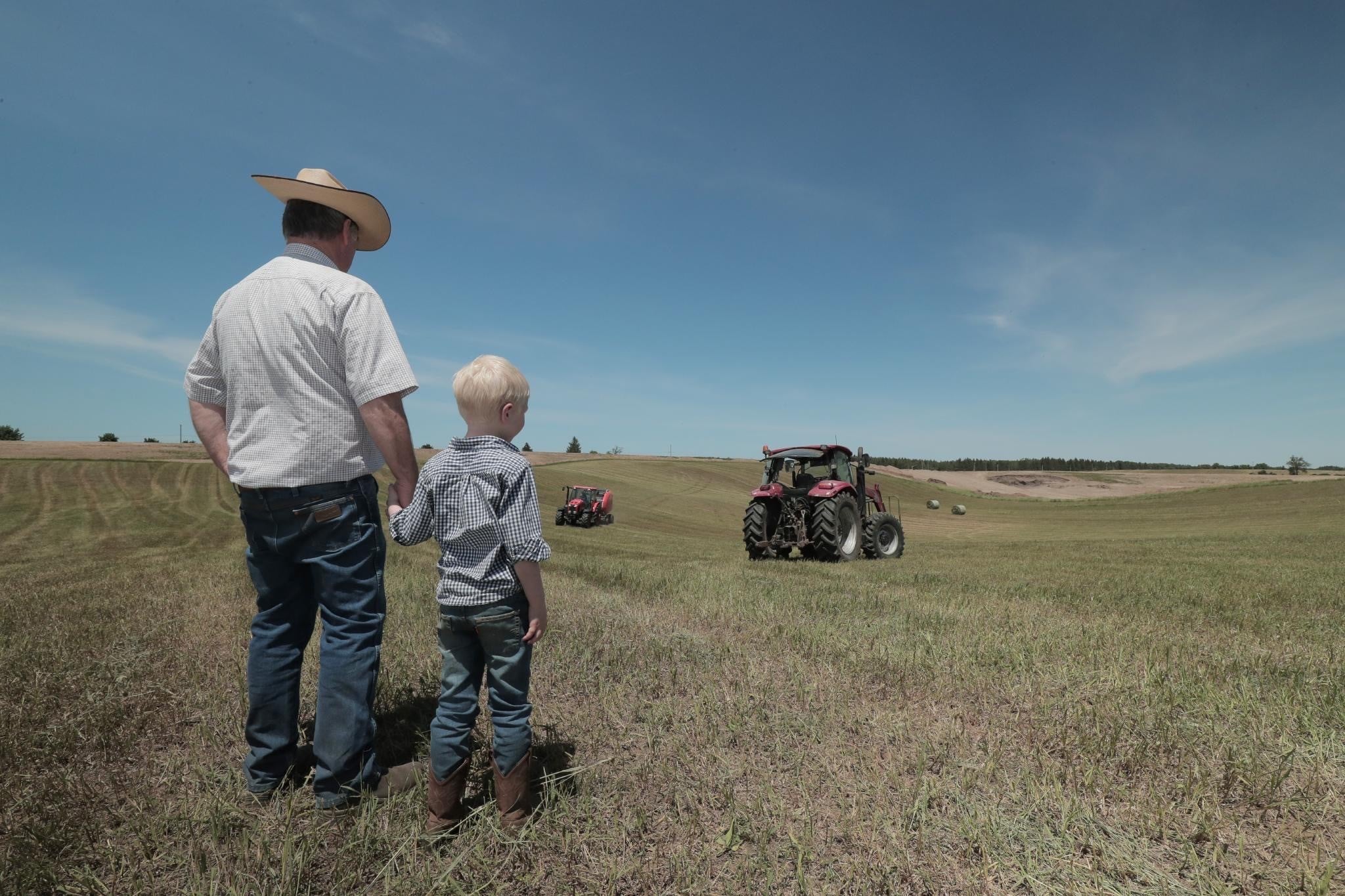Unpredictable weather and markets. Long days spent alone in the combine and tractor. The pressure of running a family farm.
The stress can build until it’s too loud to ignore.
“For many farmers, these stressors are simply part of the job,” says Che Burnett, registered social worker at Counselling Alberta. “But when stress goes unchecked for too long, it can start to affect more than just your work — it can impact your relationships, your decision-making and your overall well-being.”
Read Also

Where convention and innovation meet
How one Ontario farm is integrating technology into their beef operation.
Mental Health Week (May 5-11) is a great opportunity to talk openly about how these challenges can affect mental health, and how farmers across Canada can take practical steps to manage the stress and anxiety that come with the industry.
The weight of work
While many farmers are used to pushing through, the prolonged stress that comes with this approach doesn’t just go away. “Over time, the pressure can build up in ways you might not expect,” Burnett says. “For some, chronic stress can lead to trouble sleeping, difficulty concentrating, foggy memory, frequent outbursts, or feeling constantly on edge. For others, it can show up as sadness, anger, or isolation, and when left unaddressed, it can lead to depression, addiction, or even thoughts of suicide.
Statistics reflect the weight of the work that comes with farming. According to research from the University of Guelph, one in four farmers feel that life isn’t worth living. The Centre for Suicide Prevention reports that 57 per cent of farmers experience anxiety, 45 per cent report high stress, and 35 per cent experience depression. Yet, according to a report in The Globe and Mail, stigma around mental health and a lack of accessible resources remain barriers for farmers, with 40 per cent saying they feel uneasy asking for help.
“It’s important to understand that mental health challenges aren’t a personal failure,” says Burnett.
With a never-ending to-do list, most farmers aren’t in the habit of checking in on their own well-being, especially in a culture where hard work is valued above all else, and where asking for help may be seen as a sign of weakness.
But managing stress isn’t about doing less; it’s about taking care of yourself so that you can keep doing the work you care about.
“Think of it like running your tractor. You often check the fuel, oil and tire pressure to make sure it’s running well, so it doesn’t break down. The same goes for your mental health. Sometimes, you need to stop and check in with how you’re feeling, so you don’t burn out and can keep functioning at your best,” says Burnett.
Signs it might be time to pause
Mental Health Week serves as a timely reminder to check in — not just with others, but with yourself. Burnett encourages farmers to watch for early warning signs that stress might be taking a toll.
Burnett says that sometimes, it can be hard to know when you need a break, especially when you’re in the thick of a busy season. “You might think to yourself, ‘I’m just having a bad day. I can push through.’ But when those tough days turn into weeks or months, it’s time to check in.”

“Sound familiar?” asks Burnett. “You’re not alone. While these signs don’t always mean that something is seriously wrong, they are worth paying attention to.”
It can be easy to internalize stress as a personal failing. You might think, “I should be able to handle this” or “Other people have it worse.” But stress isn’t about weakness; it’s about capacity and understanding your limits. Just like any machine or person, there’s a limit to how much pressure you can take before something gives. The good news is there are practical, realistic ways to ease that mental load.
Strategies that work with your lifestyle
Farming doesn’t follow a nine-to-five schedule, so telling a farmer to “just relax” or “take a vacation” isn’t always helpful. But there are ways you can support your mental health that don’t involve dropping everything. “It’s often the small, intentional steps that make the biggest difference,” says Burnett.
Some of his recommendations include:
- Use time on the tractor to your advantage: Long hours alone out on the field can feel isolating, but they can also be an opportunity to connect. Call a friend, check in with family, or throw on a podcast that helps you feel grounded and supported.
- Practice check-ins: Give yourself space to ask, “How am I really doing?” Just like how you go to the doctor or dentist to look after your physical health, it’s important to do the same with your mental health.
- Break the surface: Next time you see a neighbour or run into someone at the gas station, go past a basic “How’s it going?” Try a simple follow-up such as, “No really, how are you doing? Tell me what’s been on your mind.” You don’t need to fix anything or have all the answers. Just listening to each other can go a long way.
- Visit on the way home: Make it a habit to stop in at a neighbour’s place on your way home from the farm, even for a quick coffee or chat. That connection and sense of community matters more than you think.
Dealing with uncertainty
One of the hardest parts of farming is learning to live with the unknown. Will the market hold? Will the rain come? Will the next generation want to take over? There’s no magic solution to that kind of unpredictability, but there are ways to manage it.
Burnett emphasizes the importance of going back to what is within your control. “What you eat. How much water you drink. Whether you get to bed at a decent hour. How you take care of your body. Who you turn to for support. These might seem small, but they’re often the best ways to protect your mental health,” he explains.
It’s easy to get caught up in the what ifs, especially when so much is out of your control. But constantly thinking about the unknown or bracing yourself for the worst can be mentally exhausting. Instead, Burnett suggests setting a time limit. “Give yourself 10 minutes to think about what’s bothering you, think about how it affects you, and validate those feelings. Then, when the 10 minutes is up, do your best to redirect your focus elsewhere, like a task around the house, a conversation with a friend, or even a few deep breaths,” he suggests.
“Getting involved in community events, local clubs, or even volunteering can also help shift focus away from what’s uncertain and toward what’s meaningful,” adds Burnett.
What if you’re approaching retirement or navigating a major transition? Acknowledge that it’s a big deal. Talk about it. Let others in. You don’t have to do it alone.
Asking for help is a smart business decision
In farming, problems are meant to be solved. Whether it’s a broken machine, a sick animal, or a tough growing season, farmers are quick to find a solution. But when it comes to mental health, many are hesitant to ask for help because it carries a stigma in many rural communities — particularly among men. A report from the Mental Health Commission of Canada notes that rural males are twice as likely to die by suicide than their urban counterparts.
“It’s time to challenge the idea that struggling means you’re weak. True strength means recognizing when you’re struggling and doing something about it,” says Burnett.
“Counselling can help you navigate stress, build healthier coping skills and get to the root of what’s holding you back. And yes, counselling can feel unfamiliar and intimidating. But think of it this way: just like you’d call a specialist for help with machinery, finances, animals, or crops for your farm business, a counsellor is someone trained to help you sort through tough situations, emotions and decisions. They’re there to offer tools and support that work for your lifestyle, without bias or judgment,” he adds.
Plus, accessing help has never been easier. “At Counselling Alberta, you can talk to a trained professional right from your tractor or combine if you need to,” Burnett says. “Phone and video options mean you don’t have to drive to a city or take a day off from the farm to talk to someone who gets it. You’re not weak. You’re human. And feeling better is possible.”
– Jenna Forbes is a Communications & Marketing Associate with the Calgary Counselling Centre















